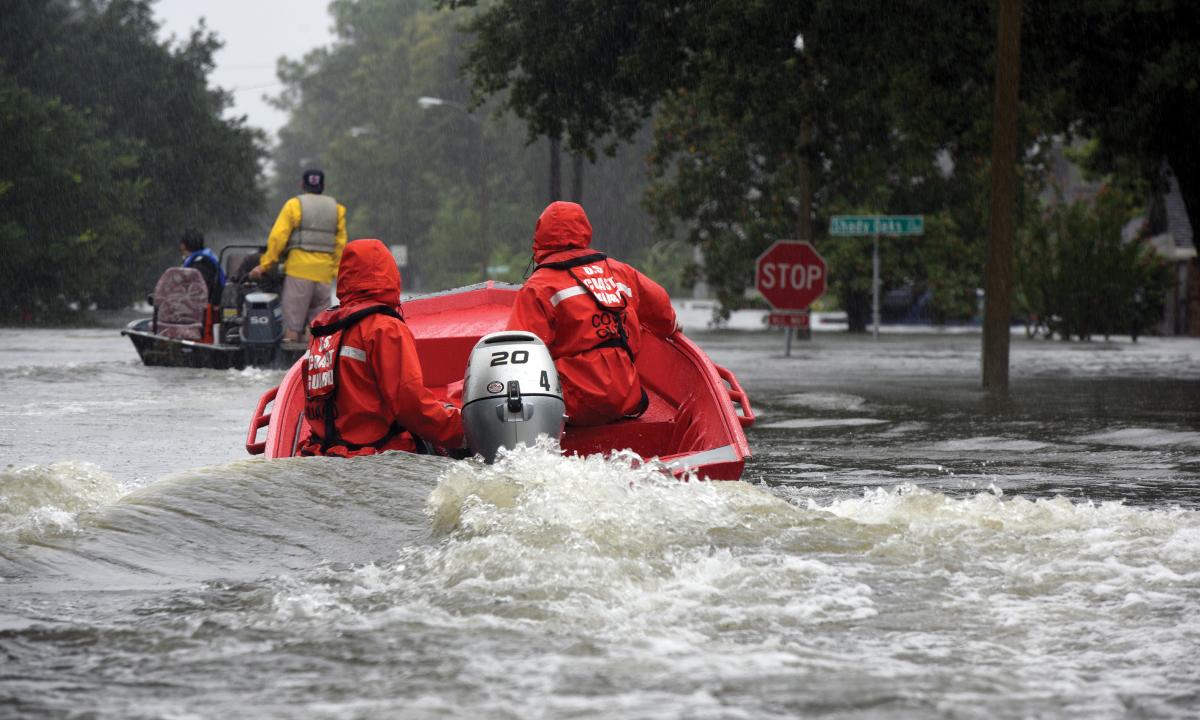In the past four years, Coast Guard District 8 has provided response crews to three natural disasters in large urban and suburban areas: the 2016 Louisiana Flood, Hurricane Harvey in 2017, and Hurricane Michael in 2018. These storms placed residents in peril and taxed local emergency resources.
I responded to Hurricane Harvey, reporting to the Port Arthur, Texas, Incident Command Post shortly before landfall. My team’s tasking was to make contact with local emergency operations centers to offer assistance. We used secondhand, flat-bottom aluminum boats, towed behind our trucks. Flooding was widespread in an urban environment that was unfamiliar to us, with streets we didn’t know and neighborhoods we had never been to. Obstacles such as submerged cars, street signs, and fence posts added to the danger of operating a boat, even a shallow drafting one.
We cleared neighborhoods using the streets as a grid. Sometimes we were directed by radio or cell phone to addresses that had called 911, but mostly it was traveling the flooded streets offering assistance. My crew evacuated a nursing home of more than 50 residents, many of whom were not ambulatory. This presented fresh challenges, such as entering potentially unsafe structures, triaging patients, and working with other urban search-and-rescue (USAR) crews.
Responding to Hurricane Michael presented a different situation. Streets made impassable and dangerous by downed power lines, trees, and other debris replaced submerged objects as our obstacles. My crew was tasked to check on affected Coast Guard members who had not updated their status or checked in with their parent commands, driving the littered streets and entering devastated neighborhoods to do so.
In each scenario, the outcome for our crews could have been radically different had good judgment, common sense, and luck not been on our side.
Current equipment and policy used by Disaster Assistance Response Teams and now the Western River Flood Punt Team are outdated and ineffective. Training for the flood punts consists of a personal qualification standard with many nonapplicable sections. The current policy, CMD8INST 3010.29 F, “Western Rivers Flood Punt for Flooding Response,” sets operating parameters and limitations for responding crews. Per policy, flood punts cannot operate in swift water, defined as water deeper than two feet moving through a defined channel at a minimum of three knots, or in seas over one foot or 20 mile-per-hour winds. These restrictions can hinder recovery and response operations in an urban environment affected by a river that has crested its banks.
Adapting to an ever-changing mission is the hallmark of the Coast Guard. Now the service must adapt for USAR.
Stations in flood-prone areas, as well as units that have a deployable capability, should look for advanced training in USAR techniques, how to mark buildings and search neighborhoods, when and how to enter structurally unsound buildings, and operating within the Incident Command System. Swift-water training should be implemented to ensure crews can conduct technical rescues safely. Training with local, state, and tribal governments should be conducted on a quarterly or monthly basis to enhance skills and integration with local emergency operations centers. Adapting and training with federal partners such as the Federal Emergency Management Agency’s Task Force 1 and the National Park Service would set up our crews for continuing success.
Being able to integrate with local emergency assets can avoid a lot of communication problems and allow for sharing of assets and quick and efficient pooling of resources. USAR should be practiced with existing flood punts in coordination with local air stations. In the 2016 Louisiana Flood, the storms came in quickly and little to no warning was issued. Rapid integration and response are high priorities in such a case. Setting a foundation that can be built on when everything around it is failing is key.
These storms are not going anywhere. More frequent and intense weather events are expected to continue, with damage to infrastructure, ecosystems, and social networks.The Coast Guard has the chance to adapt now and have procedures in place before the next disaster. To quote my old coach, “A race in July is trained for in January.”



